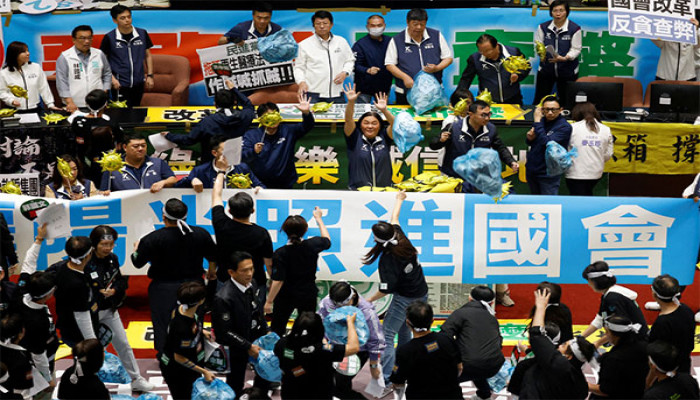Taiwan's parliament approves controversial bills expanding legislative oversight
- In Reports
- 11:48 AM, May 29, 2024
- Myind Staff
Taiwan's opposition-controlled parliament has passed a series of legal amendments designed to strengthen lawmakers' oversight of the government under President Lai Ching-te, who took office on May 20, according to Voice of America.
Despite days of widespread protests since May 17, drawing hundreds of thousands of demonstrators, the China-friendly Kuomintang (KMT) and the smaller Taiwan People's Party (TPP) utilised their combined majority to pass the bills. These bills now await the president's signature to become law.
Proponents, including KMT legislative caucus convenor Fu Kun-chi, argue that the amendments will strengthen checks and balances and empower the legislature to combat corruption. However, this move has raised significant concerns within civil society and academia.
Following the passage of the bills, Fu Kun-chi stated that lawmakers would uncover corrupt officials and various malpractices in the future. He also announced plans to establish a "special investigation team" to probe corruption cases, according to a report by Voice of America.
As legislators voted on the amendments, thousands of protesters expressed their dissent, passing around a giant white ball with the phrase "rejecting Chinese political interference."
Critics accuse the opposition parties of bypassing democratic norms by fast-tracking the legislative process without sufficient inter-party negotiations. Liao Yan-cheng, a 78-year-old retiree, lamented that the opposition's insistence on pushing the bills through without proper deliberation violated standard democratic practices. "There is a democratic negotiation mechanism in Taiwan's parliament," he noted.
Concerns arise regarding the potential misuse of legislative powers by opposition parties to undermine the governance of the Lai administration over the next four years. Max Wang, an 18-year-old student, voiced apprehension, stating that since the opposition parties will maintain control over the legislature for the next four years, they can push through controversial bills without adhering to the proper legislative process.
The reforms approved confer upon lawmakers the authority to request annual reports from the president and to interrogate government officials. Moreover, the legislature acquires increased control over government budgets and the capability to investigate government projects.
The ruling Democratic Progressive Party (DPP) criticises the reforms, contending that they could potentially undermine Taiwan's democracy. Conversely, the KMT argues that the amendments are necessary to curb the president's extensive powers.
However, significant concerns regarding the constitutionality of the reforms persist. Legal scholars and bar associations have voiced objections, indicating potential violations of the constitution of the Republic of China, as reported by VOA.
Legal expert Huang Cheng-Yi warns of constitutional concerns in the reforms and predicts DPP's challenge in the constitutional court. Analysts fear amendments could empower opposition to target Lai's administration, hampering policy and security.
President Lai is likely to urge legislators for reconsideration despite pressure. With no single-party majority, Taiwan faces political deadlock, potentially impacting defence and welfare. Huang at Academia Sinica cautions prolonged gridlock may threaten democracy, urging dialogue and compromise among parties to safeguard governance, VOA reported.
Image source: ANI







Comments